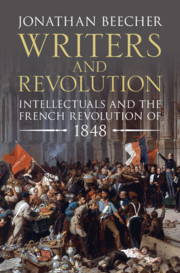5 - Victor Hugo
The Republic as a Learning Experience
Published online by Cambridge University Press: 11 March 2021
Summary
Unlike most of his contemporaries who turned away from radical politics after the June Days, Victor Hugo was both energized and radicalized by his experience of politics during the Second Republic. This chapter traces the process by which this consummate establishment figure became a living symbol of fidelity to the republican ideal in France. It tracks the developing radicalism of Hugo’s speeches in the National Assembly and focuses especially on Hugo’s experience of the June Days – he was the only one of our nine writers who took up arms against the workers’ revolt in June – and it considers Hugo’s reassessment of 1848 in his later writings, especially Les Misérables. By 1850 Hugo had emerged as the leader of the republican resistance to the Party of Order and to Louis-Napoleon. After December 2, 1851, Hugo went into exile and spent the next 19 years hurling verbal bombs at ”Napoleon the Little.” Taking pride in his exile as if it were not simply a circumstance of his life but an identity, Hugo came to symbolize in his own person republican opposition to imperial rule. How to explain Hugo’s remarkable transformation? Unlike Lamartine, Sand and others, Hugo did not at the outset expect much of anything from the Republic.
- Type
- Chapter
- Information
- Writers and RevolutionIntellectuals and the French Revolution of 1848, pp. 167 - 202Publisher: Cambridge University PressPrint publication year: 2021

